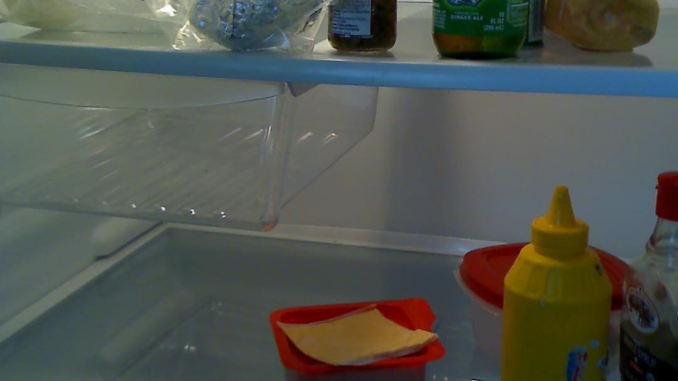

I found myself in a tough spot when my son and his wife’s actions left me and my daughter hungry on more than one occasion. It reached a point where I felt I had no choice but to give them a reality check about their behavior. This story dives into the emotional struggle of deciding whether it was right to stand up for us.
Let me take you back to when my home was quieter, and a little less crowded, but always filled with love. My name is Lucy, and I’ve lived in this cozy three-bedroom house for over twenty years.
It’s seen many phases of my life, but the latest has been quite the adventure. You see, right now, it’s not just me here. My daughter Ruby, who’s in college, and my son, Brian, and his wife, Emily, also call this place home.
Brian and Emily moved in a few months ago to save up some money, a decision we all agreed on. It seemed like a perfect plan at the time. In the beginning, things were smooth. Our home felt livelier, and there was always someone to talk to.
I’ve always enjoyed cooking, and with more people around, meal times became these wonderful, communal moments. Ruby, always buried in her books, would surface with stories from college. Brian would share updates from work, and Emily brought new energy into our home, always eager to help set the table or wash the dishes.
“Mom, dinner smells amazing!” Ruby would say, her eyes lighting up as she entered the kitchen, a stack of textbooks in her arms.
“Thanks, honey. It’s nothing special, just your favorite spaghetti tonight,” I’d reply, stirring the pot as the aroma of tomato and basil filled the air.
Brian and Emily would come down together, laughing about some inside joke or another, adding to the evening’s warmth. “Need any help, Mom?” Brian would offer, though he knew I had everything under control.

“No, no, you two go ahead and sit down. Dinner’s almost ready,” I’d insist, with a smile, happy to see my children and daughter-in-law getting along so well.
Back then, cooking for four didn’t seem like a challenge. I’ve always made it a point to prepare hearty meals that could feed us, with some leftovers for anyone to grab later. Our refrigerator was like a treasure trove of comfort food, ready to meet any late-night craving or serve as a quick lunch before heading out the door.
Our conversations around the dinner table were lively, filled with discussions about Ruby’s college life, Brian and Emily’s plans for the future, and my little stories from work. It was in these moments that I felt most content, seeing my family together, and sharing meals I prepared with love.
But as time passed, I started to notice changes. They were subtle at first, then unmistakably clear. The balance we had achieved and the rhythm of our shared lives began to shift, and it was not for the better. It wasn’t anything dramatic, mind you. Just little signs that the harmony we enjoyed was being tested.
Ruby began spending more time at the library, saying she needed to focus on her studies. Brian and Emily, trying to save every penny, rarely went out, which meant more meals at home. And I, well, I continued to do what I’ve always done — cook, hoping to keep everyone happy and well-fed.
Yet, as our routines evolved, so did the dynamics at our dinner table. The portions that once seemed plentiful now barely made it around. Leftovers, a common sight in our fridge, became a rarity. The feeling of abundance I took pride in providing began to slip away.
It’s funny how something as simple as sharing a meal can reveal so much about the state of a household. For us, it was the beginning of a realization that things couldn’t go on this way.
Little did I know, it would lead me to make decisions I never thought I’d have to, challenging the foundation of our family’s togetherness. As days turned into weeks, the change in our household’s food dynamics became impossible to ignore.
One evening stands out in my memory, marking the moment I realized the extent of the issue. I had spent the afternoon making a pound of spaghetti with meat sauce, a dish that had always been a hit with my family. The savory aroma filled the kitchen, promising a comforting meal after a long day.
“I’ll finish up these chores before sitting down to eat,” I thought to myself, not suspecting for a moment that there would be none left for me. But that’s exactly what happened. By the time I was ready, the pot was scraped clean, not a single noodle in sight.
Ruby came home later that evening, her face falling as she opened the fridge, hoping for a plate of the spaghetti she had been looking forward to all day. “Mom, did you save me any dinner?” she asked, trying to hide her disappointment.
“I’m sorry, honey,” I sighed, “It’s all gone. Brian and Emily got to it first.”

This wasn’t an isolated incident. Another day, I decided to bake a two-layer cake, thinking it would be a nice treat for the family. I carefully mixed the batter, poured it into pans, and watched as it rose in the oven. The cake was golden and perfect when I left for work, a sweet surprise I hoped everyone would enjoy together.
Imagine my shock when I came home to find only a thin slice left, the rest devoured in less than eight hours. My heart sank. It wasn’t about the cake or the spaghetti. It was the realization that my efforts to nourish my family were being overlooked, leaving Ruby and me out in the cold.
“Mom, this isn’t working,” Ruby finally said one night, her frustration mirroring my own. “I’m always hungry when I get home, and there’s never anything left for us to eat.”
I could see the toll it was taking on her, and it pained me. My daughter, who was working hard in college, couldn’t find a decent meal in her home. And I, too, felt the strain, my grocery bills climbing as I tried to keep up with the increased demand, only to be left with an empty fridge repeatedly.
“Something has to change,” I told Ruby, my mind racing for solutions. The situation was unsustainable, and unfair to both of us. It wasn’t about the food. It was about respect, consideration, and understanding — values I held dear and expected everyone in my household to share.
As I lay in bed that night, thoughts swirling in my head, I knew I had to address the issue head-on. No more tiptoeing around, hoping things would improve on their own. Brian and Emily needed a reality check, a reminder that this was a shared home, not a free-for-all buffet.
The next morning, I made a decision. It was time to sit everyone down and lay out the new rules, a plan to ensure fairness and respect at our dinner table. I was nervous, unsure of how my proposal would be received, but determined to restore harmony to our home.
Little did I know, that the conversation I was about to start would set off a chain of events that would challenge the very foundation of our family dynamics. But at that moment, all I could think about was finding a way to make things right, to ensure that no one in my home would have to go hungry again.

The tension in our home had reached a boiling point, and with a heavy heart, I knew it was time to address the elephant in the room: our food situation. Gathering my courage, I called a family meeting. This would soon prove more pivotal than any of us could have imagined.
“Everyone, please, have a seat,” I began, my voice steady despite the butterflies in my stomach. Brian, Emily, and Ruby settled around our kitchen table, a mix of curiosity and concern etched on their faces.
“I think we all know why we’re here,” I continued, locking eyes with each of them in turn. “Our current situation with food in the house isn’t working. It’s not fair for some of us to be left without meals.”
“It’s not about being excessive, Brian. It’s about ensuring fairness and respect for everyone’s needs,” I replied, firm yet compassionate. “We have to find a way to make this work for all of us.”
The meeting ended with a tense agreement to try my new system. Despite the apprehension, I felt a glimmer of hope. That night, I carefully plated our dinner, ensuring each portion was fair and satisfying. Afterward, I divided the leftovers, labeling each container with our names before placing them in the fridge.
The next morning, I awoke to find Ruby in the kitchen, a smile on her face as she prepared her breakfast.
“Mom, I just wanted to say thank you,” she said, her eyes meeting mine. “Last night was the first time in a while I went to bed feeling full. And look,” she gestured to the fridge, “I actually have leftovers for lunch today.”
Her words warmed my heart, a bittersweet confirmation that my decision, though difficult, was the right one. For the first time in weeks, I felt a sense of relief wash over me. Maybe, just maybe, this could work.
I was making coffee when Brian and Emily came down. I immediately noticed the surprise on their faces as they opened the fridge and saw the labeled containers. Their expressions were a mix of confusion and disbelief.
“Mom, what’s this?” Brian asked, holding up a container marked “Brian’s leftovers.”
“It’s exactly what it looks like. It’s your portion of the leftovers,” I explained, trying to keep my tone neutral.
Emily, who had been quietly observing until now, finally spoke up, her voice tinged with irritation. “Mom, is this really necessary?” she asked. Her tone was a mix of confusion and frustration.
“Yes, it is,” I responded, my voice gentle but unwavering. “It’s important that we all have equal access to the food in this house. This is the best way I know how to ensure that happens.”
“This is ridiculous,” Emily finally said, her voice cold. “We shouldn’t have to live like this.”
“This feels a bit… heartless, don’t you think? We’re family, not roommates,” she continued.
Her words stung, but I stood firm. “Being a family means respecting each other’s needs. Ruby and I have been left without enough food too many times. This is about making sure everyone gets their fair share.”
The conversation escalated in no time. Brian, visibly upset, retorted, “We never agreed to this. You’re being heartless and treating us like children.”
“And what about Ruby? Should she have to fend for herself because you two eat everything?” I countered, my frustration growing. Ruby had been silently supporting me, her presence a quiet reminder of why I had made these changes.
“I shouldn’t have to worry about my daughter going hungry in her home,” I replied, my voice steady despite the turmoil inside me.

The argument intensified, with Brian and Emily refusing to see our perspective. “We’re trying to save money here, Mom. We can’t afford to buy extra food every time we’re a bit hungry,” Brian argued.
“And I’m trying to make sure everyone in this house is fed,” I shot back, the weight of the past weeks heavy in my voice. “But if you’re not willing to adapt or even contribute to the grocery bills, then maybe this arrangement isn’t working.”
Despite the tension, I couldn’t ignore the sense of accomplishment I felt. For the first time in a long while, Ruby and I could enjoy our meal, secure in the knowledge that we wouldn’t go hungry.
Ruby came down shortly after, having heard the tail end of our argument. She looked at me with a mix of concern and gratitude. “Mom, I know that wasn’t easy. But thank you, for standing up for us.”
Her words were a small comfort in the storm brewing in our home. I had hoped my decision would bring us closer to fairness and understanding. Instead, it drove a wedge deeper into the heart of our family.
This was a reality check for all of us, a reminder of the importance of fairness and consideration within our family. As we cleared the table, I wondered about the lasting impact of my decision. Change is never easy, but sometimes, it’s necessary for the well-being of those we love
As the days passed, the atmosphere in our home grew more strained. Brian and Emily kept to themselves, their interactions with me and Ruby minimal and strained. The joy and warmth that once filled our household had been replaced by a palpable chill, a constant reminder of the cost of standing up for what I believed was right.
One evening, I asked Brian and Emily to join me in the living room. Ruby, sensing the gravity of the moment, sat quietly beside me. The air was heavy, filled with unspoken words and pent-up frustrations.
“Brian, Emily,” I began, my voice firmer than I felt, “this situation isn’t sustainable. We’ve all been unhappy, and it’s clear that something needs to change.”
They both nodded, their expressions guarded, waiting for me to continue.
“I’ve given this a lot of thought,” I continued, “and I’ve come to a difficult decision. If we can’t find a way to live together respectfully, following the rules we’ve set for our home, then I think it’s best if you find another place to live.”
The words hung in the air, heavy and final. Brian looked at me, his face a mixture of shock and anger, while Emily’s expression hardened.
“So, that’s it then? You’re kicking us out?” Brian’s voice was sharp, cutting through the silence.
“It’s not about kicking you out,” I replied, struggling to keep my voice steady. “It’s about respecting each other’s needs. I’ve tried to find a fair solution, but if we can’t live together peacefully, then maybe it’s time for a change.”
The conversation that followed was one of the hardest I’ve ever had. Voices were raised, accusations thrown, and for a moment, I feared the rift between us might never heal. But beneath the anger and hurt, I knew this was a necessary step for me, Ruby, Brian, and Emily.
After they stormed off, Ruby reached over and squeezed my hand. “Mom, I know that was tough. But, in my honest opinion, you did the right thing.”
Her words were a balm, yet I couldn’t shake the feeling of doubt that settled in my chest. Had I made the right decision? Or had I pushed my son away?
That night, I lay awake, the house quiet around me. I replayed the events of the past weeks, each decision and argument.
As dawn broke, I realized that my ultimatum wasn’t only a demand for respect. It was a lesson in boundaries and consequences. Yes, family is about unconditional love, but it’s also about mutual respect and consideration for each other’s needs.

As I reflect on the ordeal, I can’t help but wonder about the future. Will Brian and Emily understand why I had to take a stand? Will our family find its way back to each other?
Despite the uncertainty, one thing is clear. This experience has taught us all valuable lessons about the importance of communication, respect, and compromise. And while the road ahead may be uncertain, I hold onto the hope that, in time, we’ll bridge the gap that’s formed between us.
I realized that sometimes, being a parent means making tough decisions for the greater good, even if it leads to uncomfortable confrontations. My priority was to ensure the well-being of my family, even if it meant facing resistance from those I was trying to protect.
The fallout from our confrontation was a bitter pill to swallow. I was prepared to face it, armed with the conviction that I had made the right choice for Ruby and myself. What would you have done if you were in my shoes?
Mom Never Says ‘No’ to Her Kids When They Say They’re Hungry
Rachel said that she and her husband would not punish their children as harshly if the children told them they had done something wrong before she found out. Rachel said she would answer any question, no matter the topic. She also said she would handle food differently to many parents.
Rachel said she would never say no to her children when they told her they were hungry. She shared:
“There will never be an instance where I say, ‘You can wait,’ or ‘Not right now,’ or ‘The kitchen is closed.’”
This stay-at-home mom believes that she should not teach her children to ignore the natural cues of their bodies. She said that if she restricted food, her children would become deceitful about when they were eating. She knew this because it was something she had done.
Rachel opened the video saying these were parenting strategies she had that went “against the grain.” Yet, she received many comments about the food strategy, in which people said they did the same thing.
Rachel received many comments asking how she handled the conversation about food with her children. One asked what she would do if her children told her they were hungry, but dinner was 30 minutes away from being ready.
She said she would give them a small snack, like a “cheese stick or a handful of veggie straws.” This would tide them over until their dinner was ready, which would go a long way with a small child.
Another commenter said they only refused their child food if dinner was five minutes away from being served. Rachel replied:
“Oh yeah, then I just say, ‘Get yourself something to drink, wash your hands, and have a seat.’”
One user said that the only thing she disagreed with Rachel on was eating because she would never allow her child to have a cookie before dinner. Rachel advised the woman to offer her children a snack that wouldn’t ruin their dinner.
One woman remarked: “My MIL [mother-in-law] does not understand why I ALWAYS have snacks for the kids.” The woman’s mother-in-law had told her that her children had only ever eaten when they were told they could.
The same woman said she would even give her children snacks at a restaurant while they waited for their food if they wanted it. The woman added that she received dirty looks because of it, but she did not care.
Another mother said she allowed her children to eat whenever they wanted, but they were not allowed to eat unhealthy snacks all day. Rachel agreed that children should be allowed to eat whenever they wanted, just not whatever they wanted. She said she and her family stuck to “always” and “sometimes” foods.
While some mothers prefer to be open with their children to avoid harsh punishment, like Rachel, other parents have a different ethos. One such woman punished her son, but her husband was not on board with the punishment. You can read the full story here.
Để lại một phản hồi